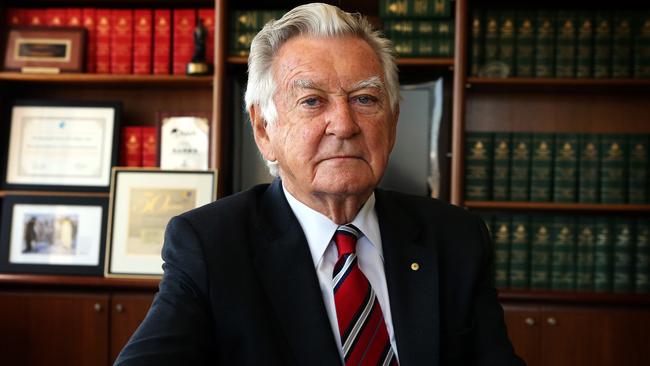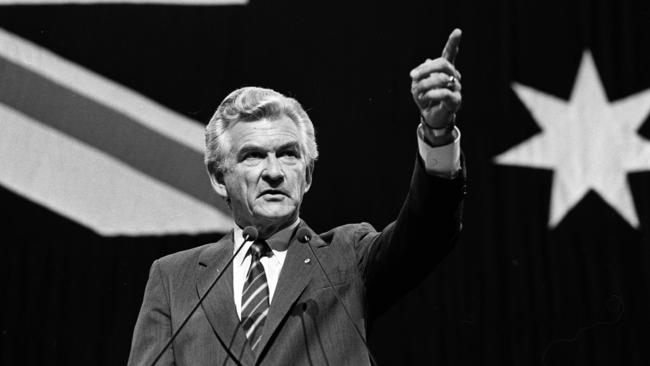Secret notes claim Bob Hawke ‘informed’ for US government
Bob Hawke was an ‘informer’ during his time as union chief and ALP president, a study of declassified cables claims.

Bob Hawke acted as an “informer” to the US government while boss of the Australian trade union movement and president of the ALP, a new study of declassified diplomatic cables claims.
Cameron Coventry, a researcher at Federation University in Ballarat, sheds light on how the man who was to later become a Labor prime minister fed intelligence to the Americans about labour movement figures and Australian government policy, even tip-offs that a secretive US military installation was to be targeted by union militants.
He was considered by Washington to be a “bulwark” against anti-US sentiment in the 1970s.
When the Whitlam government hit the skids, Mr Hawke floated with US diplomats the possibility he would abandon the ALP to pursue a British-style national unity government to face a deepening economic crisis in Australia, according to the documents accessed by Mr Coventry.
In conversation with diplomats from the US embassy in Canberra in late 1974, he recounted receiving “several feelers about political realignment” including one from his lifelong friend, Sir Peter Abeles, described in the subsequent cable to Washington as the “controversial industrialist who is a financial supporter of the Labor Party but whose personal philosophy fits him within the Liberal Party context”.
The message read: “Apparently Abels (sic) has recently sounded out Hawke’s availability for a leadership position in such a new political movement. Hawke reported this flatly, without indicating whether or not he favoured such an idea.”

After the dismissal of the Labor government in 1975, Mr Hawke briefed US diplomats that he would “move over” from the ACTU to replace Gough Whitlam as leader. NSW Labor powerbroker John Ducker, another alleged informant for the Americans, later told them that the “cabal conspiracy” to install Mr Hawke failed because the plotters made “a bad mistake to tip their hand prematurely”, according to an American cable cited by Mr Coventry.
A tutor and PhD candidate at Federation University who worked on the political staff of former South Australian senator Nick Xenophon, he turned up the tranche of confidential diplomatic communications from 1973-79 held by the US National Archives and Records Administration.
His paper, The “Eloquence” of Robert J. Hawke: United States Informer, is published in the Australian Journal of Politics and History.
“Evidently, Hawke was an informer to the allied foreign power in the 1970s,” Mr Coventry writes. “Conversations he had with United States diplomats involved information that was pertinent to the preservation of American interests in Australia.
“As a well-placed insider in the ACTU and Labor, Hawke offered greater leverage in the pursuit of these interests, including the protection of multinational corporations operating in Australia.”
But Labor elder Stephen Loosely, a former ALP national president and senator, said it was “nonsense” to describe Australia’s longest-serving Labor prime minister as an informer. After entering parliament in 1980, the late Mr Hawke was PM from 1983-91, presiding over four election victories and a reform program that shaped modern Australia.
“He was an Australian first, last and always, as was John Ducker,” said Mr Loosely, a senior visiting fellow at the US Studies Centre, University of Sydney.
“For someone half a century later to label these people informants, when they can’t defend themselves, simply doesn’t hold water. Anyone who has ever been active at any level of politics or unionism understands that.”
In Mr Hawke’s time as a US “informer”, Mr Coventry alleges he divulged sensitive information about the 1972-75 Whitlam government, Malcolm Fraser’s 1975-83 Coalition government, the Labor Party and trade union movement touching on industrial relations policy, the economy and foreign policy.
In 1974, a cable had him leaking to US ambassador Marshall Green details of a union campaign to target American multinationals, such as carmaker Ford; a year earlier, the US labour attache in Canberra had contacted Mr Hawke about a possible industrial dispute at the North West Cape military base in Western Australia, a highly-classified communications station for the US nuclear submarine fleet.
According to the cable cited by Mr Coventry, Mr Hawke “volunteered to intervene informally” and expressed “concern and surprise” at the militancy of the workers concerned.
In another exchange with the labour attache in December 1974, he predicted the Whitlam government would fall inside a year, having confided that Australia’s stagflation-hit economy was “on the verge” of collapse.
At other times, Mr Hawke expressed his desire for an “independent non-aligned Australia” while privately telling the Americans he wanted to expand the ANZUS co-defence pact beyond a “purely military alliance”.
The US embassy in Canberra reasoned this “duality” was to garner left-wing support for his preselection for a seat in federal parliament.
The cables show the US was a “discreet advocate” encouraging Mr Hawke as early as August 1974 to pursue “tripartism” between unions, employers and the government, laying the groundwork for his Labor government’s signature accord on wages with the union movement.
Mr Hawke told US diplomats in 1974 that, contrary to his public protestations as ACTU president, union wage demands were driving the rampant inflation that had choked the Australian economy, delivering counter-cyclic lows in growth.
One example of how Mr Hawke, working with Mr Ducker, the president of the NSW Labor Party and ACTU vice-president, eased “heightened anti-American sentiment” came during Frank Sinatra’s 1974 tour after the US crooner launched his “hookers of the press” sexist diatribe at several women journalists.
In retaliation, unions grounded Sinatra’s private jet in Melbourne, demanding he apologise. The popular view was that Mr Hawke engaged in protracted, boozy negotiations with Oil’ Blue Eyes to reach a settlement.
The cables say the US embassy reached a deal with Mr Hawke to end the standoff, no apology was sought from Sinatra and that most of Mr Hawke’s time was spent with the singer’s lawyer.




To join the conversation, please log in. Don't have an account? Register
Join the conversation, you are commenting as Logout